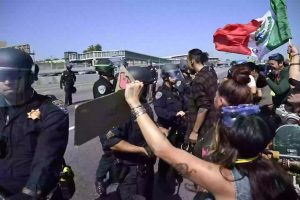Florida Sheriff’s Threatening Remarks Spark National Outrage
A Florida sheriff’s fiery comments at a recent press conference have triggered national backlash, with critics accusing him of using violent rhetoric that could suppress peaceful protests and violate constitutional rights.
What Happened
Sheriff Wayne Ivey of Brevard County was addressing preparations for upcoming immigration-related demonstrations when his tone turned sharply aggressive. Instead of a routine briefing, Ivey issued stark warnings to protesters, saying anyone blocking roads would “go to jail,” and threatening: “If you hit one of us, you’re going to the hospital and jail… If you throw a brick, firebomb, or point a gun, we’ll notify your family where to collect your remains.”
His statements quickly went viral, sparking debate over police overreach and the First Amendment.
Backdrop of Tension
The press conference came amid nationwide protests over increased immigration enforcement and high-profile detentions, including social media figure Khaby Lame. With demonstrations planned for former President Trump’s birthday in Washington, D.C., law enforcement across the U.S. is on high alert.
Legal and Civil Rights Concerns
Civil liberties groups, including the ACLU and NAACP, condemned Ivey’s language as dangerous and unconstitutional. Legal experts warn his words could be interpreted as criminal threats and may have a chilling effect on free speech. Professor Sarah Martinez, a constitutional law scholar, called the remarks “intimidation, not law enforcement.”
A Pattern of Controversy
Ivey is no stranger to provocative public comments. He’s known for using social media to mock suspects and even ran a “Wheel of Fugitive” video series that led to a defamation lawsuit. Critics say his communication style undermines trust and accountability in law enforcement.
Divided Reactions
While conservative voices and some locals praised Ivey’s tough talk as necessary deterrence, many others—including Democratic leaders—called for investigations and disciplinary action. Rep. Alexandria Ocasio-Cortez described his threats as “police militarization that undermines democracy.”
Bigger Picture
This incident touches on larger national questions: How should police balance public safety and the right to protest? Experts say best practices call for de-escalation and professionalism—not threats. Ivey’s remarks, they argue, could escalate tensions rather than prevent them.

As debate continues, this controversy highlights the urgent need for thoughtful law enforcement leadership, especially in times of national unrest. What happens next could shape how protest policing and public accountability evolve in America.



